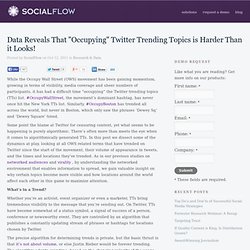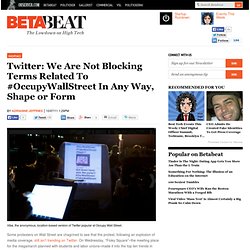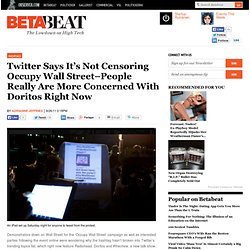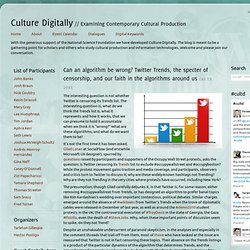

Twitter Buzz Builds for the OWS Movement. Buzz about the Occupy Wall Street movement is building to a fever pitch.

Reaching its peak on Oct. 6, the conversation about the protests still shows upward momentum, and new research from NM Incite reveals new findings about how Occupy Wall Street is playing out in social media. By studying and analyzing tweets (update: as well as blogs, boards, groups, and video/images in this first graphic), NM Incite discovered that while the Twitter and other social media buzz remained relatively steady and peaked on the weekends throughout September, the biggest boost to the number of people conversing about this topic began Oct. 1 and peaked on Thursday, Oct. 6, when the five-day surge had 13,133 messages posted about the protests on that day.
What happened on Oct. 1? People were buzzing about the arrest of more than 700 protesters on the Brooklyn Bridge: Data Reveals That “Occupying” Twitter Trending Topics is Harder Than it Looks! While the Occupy Wall Street (OWS) movement has been gaining momentum, growing in terms of visibility, media coverage and sheer numbers of participants, it has had a difficult time “occupying” the Twitter trending topics (TTs) list.

#OccupyWallStreet, the movement’s dominant hashtag, has never once hit the New York TTs list. Similarly, #OccupyBoston has trended all across the world, but never in Boston, which only saw the phrases ‘Dewey Sq’ and ‘Dewey Square’ trend. Some point the blame at Twitter for censoring content, yet what seems to be happening is purely algorithmic. There’s often more than meets the eye when it comes to algorithmically generated TTs.
In this post we dissect some of the dynamics at play, looking at all OWS related terms that have trended on Twitter since the start of the movement, their volume of appearance in tweets, and the times and locations they’ve trended. What’s in a Trend? Censorship? Interesting. #OccupyWallStreet – A closer look Competing for Attention. Twitter: We Are Not Blocking Terms Related To #OccupyWallStreet In Any Way, Shape or Form. By Adrianne Jeffries 10/07/11 1:29pm Share this: Vibe, the anonymous, location-based version of Twitter popular at Occupy Wall Street.

Some protesters on Wall Street are chagrined to see that the protest, following an explosion of media coverage, still isn’t trending on Twitter. On Wednesday, “Foley Square”–the meeting place for the megamarch planned with students and labor unions–made it into the top ten trends in New York. “Truly, @twitter.
But even “Foley Square” was quickly supplanted by terms related to the death of Steve Jobs. Twitter faced similar accusations back in February over Wikileaks, as some users wondered if tweets related to the controversial hacktivist group were being censored. And while it may look to a user like no one is talking about anything else, that’s a fallacy of self-selection due to the fact that users tend to follow other people who are similar to them.
Follow Adrianne Jeffries on Twitter or via RSS. ajeffries@observer.com by Taboolaby Taboola LonnyMag. Twitter Says It’s Not Censoring Occupy Wall Street–People Really Are More Concerned With Doritos Right Now. By Adrianne Jeffries 9/26/11 3:18pm Share this: An iPad set up Saturday night for anyone to tweet from the protest.

Demonstrators down on Wall Street for the ‘Occupy Wall Street’ campaign as well as interested parties following the event online were wondering why the hashtag hasn’t broken into Twitter’s trending topics list, which right now feature Radiohead, Doritos and #thechew, a new talk show. Considering there is evidence that Yahoo is blocking emails about the protest with a message about “suspicious activity,” it was suggested that Twitter was also censoring the topic.
Not so, says Twitter’s Carolyn Penner, who pointed us to this blog post, written after people made the same speculation about the #wikileaks tag, which explains that Twitter’s trending topics are based on what’s breaking out rather than what’s popular. Sometimes a topic doesn’t break into the Trends list because its popularity isn’t as widespread as people believe. By Taboolaby Taboola Promoted ContentPromoted Content. Can an algorithm be wrong? The interesting question is not whether Twitter is censoring its Trends list.

The interesting question is, what do we think the Trends list is, what it represents and how it works, that we can presume to hold it accountable when we think it is “wrong?” What are these algorithms, and what do we want them to be? It’s not the first time it has been asked. Gilad Lotan at SocialFlow (and erstwhile Microsoft UX designer), spurred by questions raised by participants and supporters of the Occupy Wall Street protests, asks the question: is Twitter censoring its Trends list to exclude #occupywallstreet and #occupyboston?